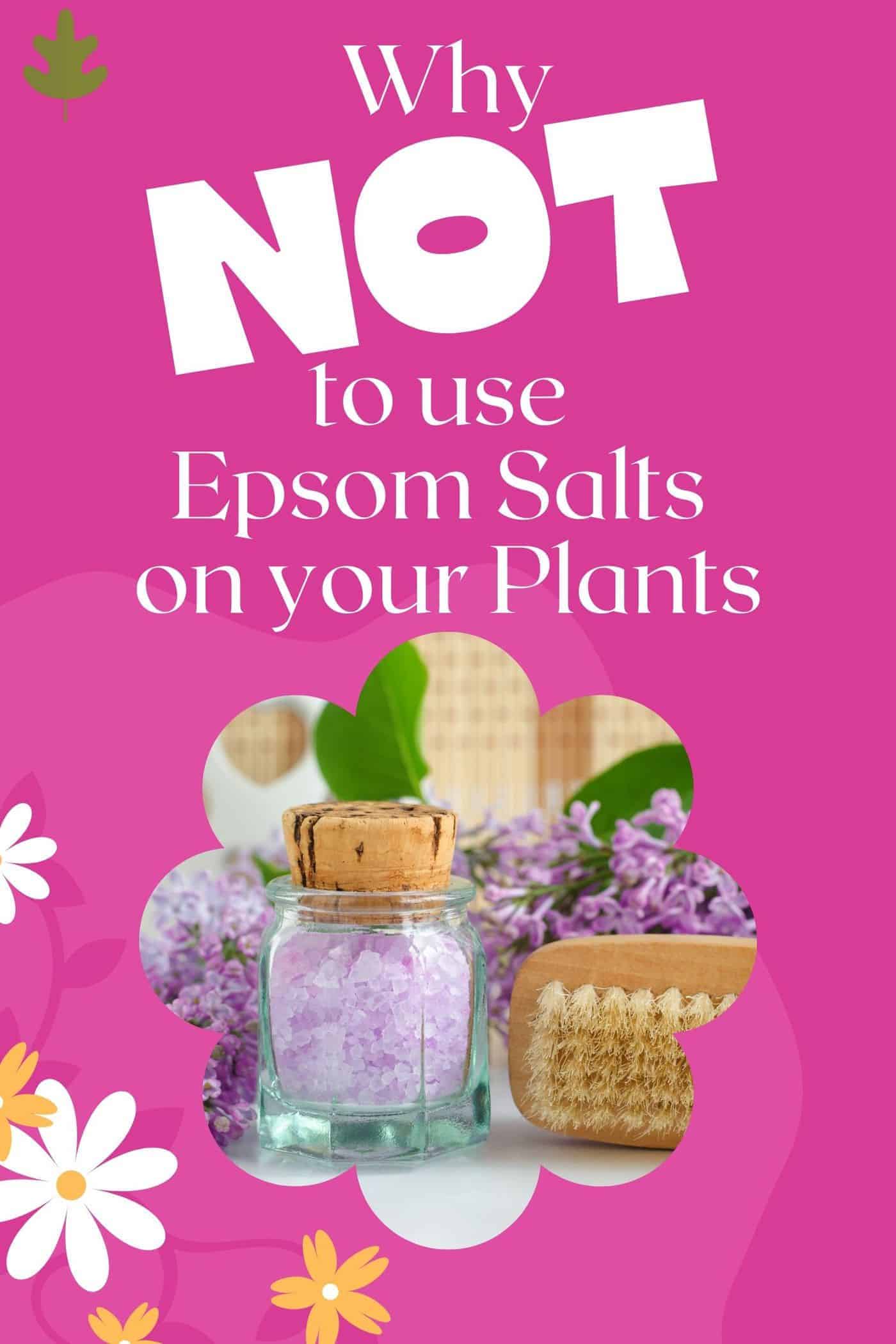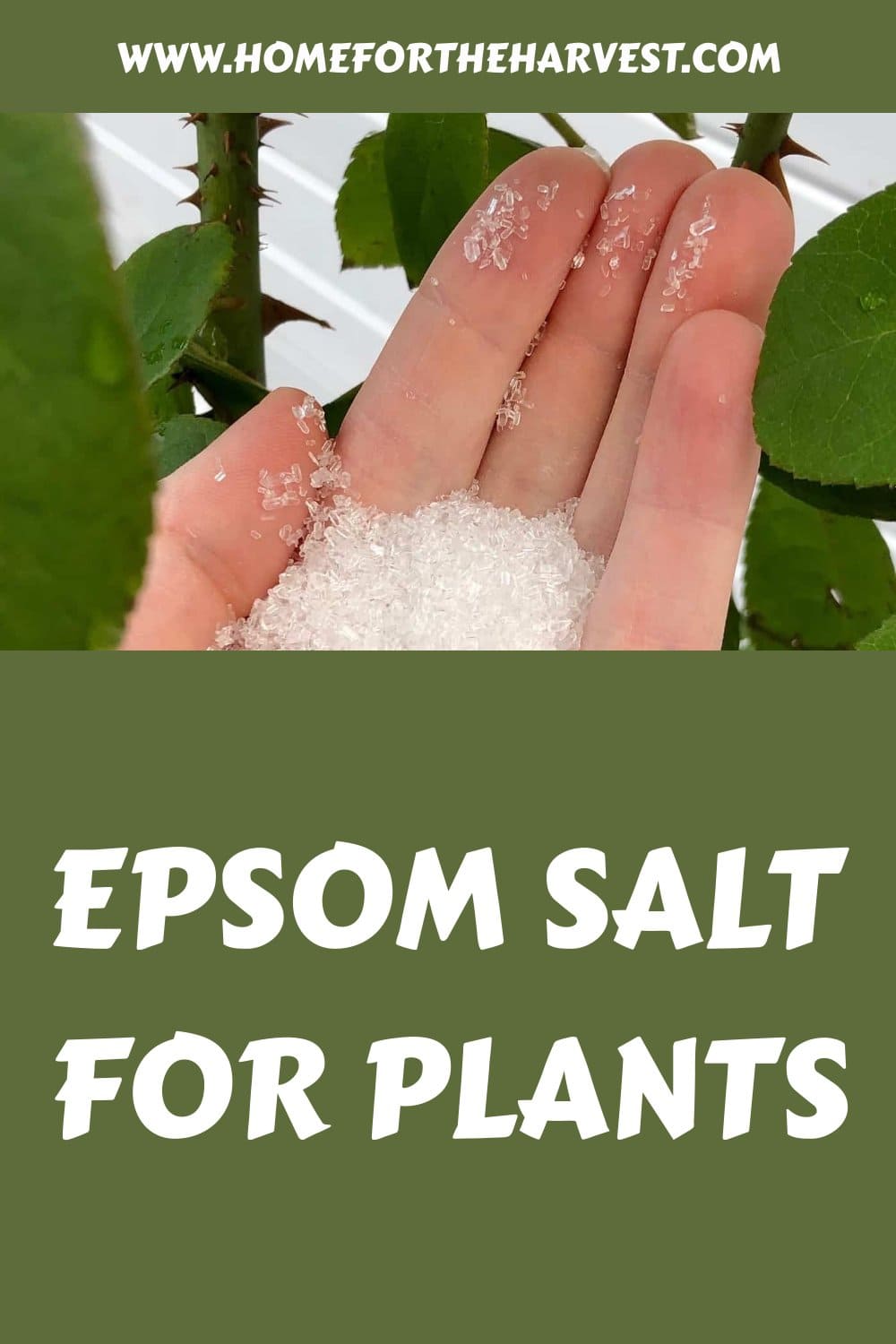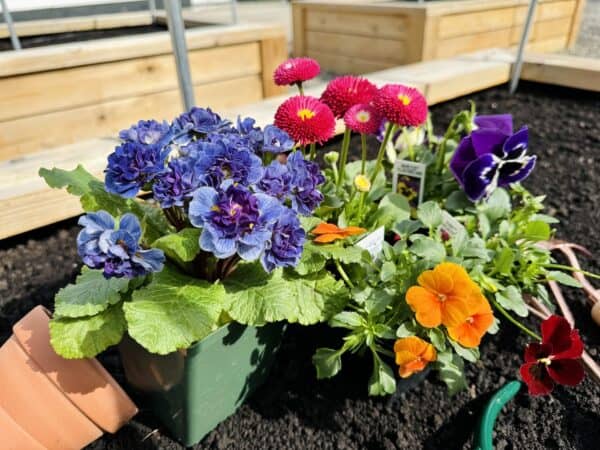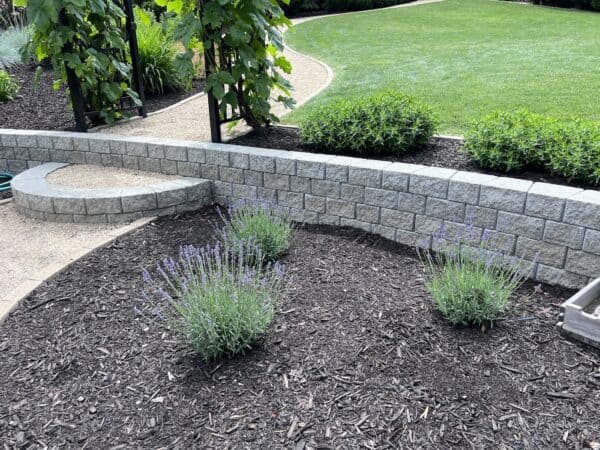Who has seen the recommendation to add Epsom salt to your roses, tomatoes, or just indiscriminately all over the garden!? I certainly have. Epsom salt is a mineral often promoted as an “organic” plant fertilizer for tomatoes, peppers, and gardens in general. As a new gardener, I saw this advice so often that I decided to look into this soil amendment. Here’s what I found.
The general consensus from the horticultural community is Epsom salt should NOT be used for plants in home gardens. The benefits of Epsom salt in the garden have not been proven and the risks to the environment are considerable. Choose a proper high-quality organic plant fertilizer instead of generic Epsom salts.
It seems much of the advice to use Epsom salts on plants is anecdotal and is not supported by scientific research or advised by prominent horticultural organizations. The risks detailed by the horticultural community, however, are enough to persuade me not to use Epsom salts on my plants. Household chemicals are not a cheap substitute for proper organic fertilizer.
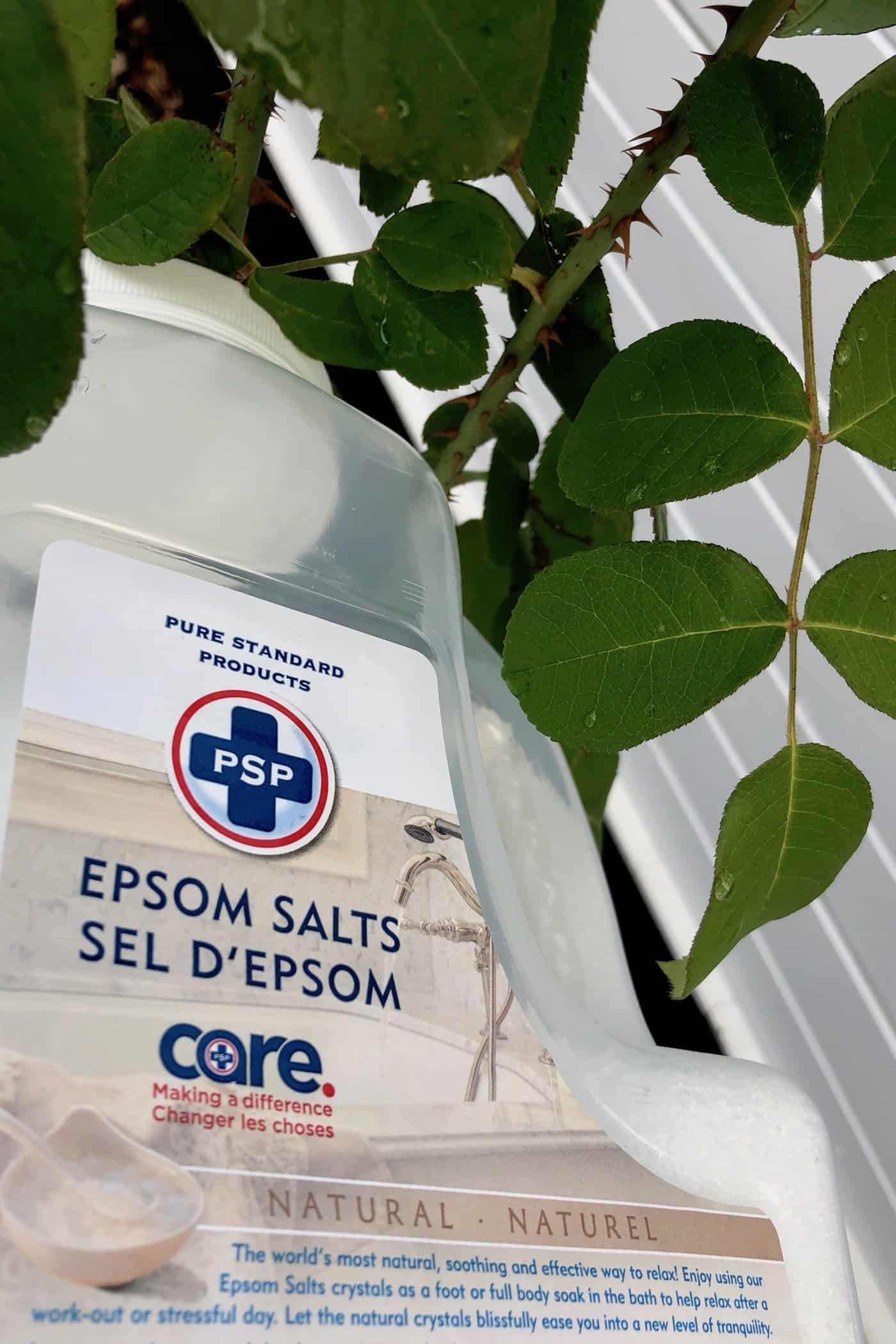
Why not to use Epsom salts for your plants
Here are the key reasons not to use Epsom salts for your plants:
- Epsom salt products are generally synthesized from feedstock ore in chemical plants (making them synthetic products).
- Chances are slim to none that the product is OMRI-listed as safe for use in organic plant production.
- It is highly uncommon for gardeners to actually get a current laboratory test for magnesium content in their soil before applying Epsom salts.
- Epsom salt is not a balanced fertilizer, providing only magnesium. Applying a single, isolated nutrient can disrupt the soil ecosystem, particularly the crucial ratio of magnesium to calcium that plants depend on.
- Epsom salt is highly soluble in water (obviously), and quickly washes right through your soil and into local groundwater as an urban pollutant.
- Your own homemade compost will do so much more for your plants anyways!
What to use instead of Epsom salt for your plants
Here are 5 great options to boost nutrients for your plants without resorting to bath salt crystals:
- Homemade Compost
- Organic Fertilizer
- Espoma Plant-Tone
- SoilKey Organic Fertilizer
- SUPERthrive Organic All-Purpose Plant Food
- Natural Soil Amendments
- Homemade Compost
- Worm Castings Organic Plant Food
- Sustane Organic Concentrated Compost
Compost, organic fertilizer, and naturally-sourced soil amendments are much less likely to cause environmental harm while retaining the nutrient-boosting effect (in a more balanced manner).
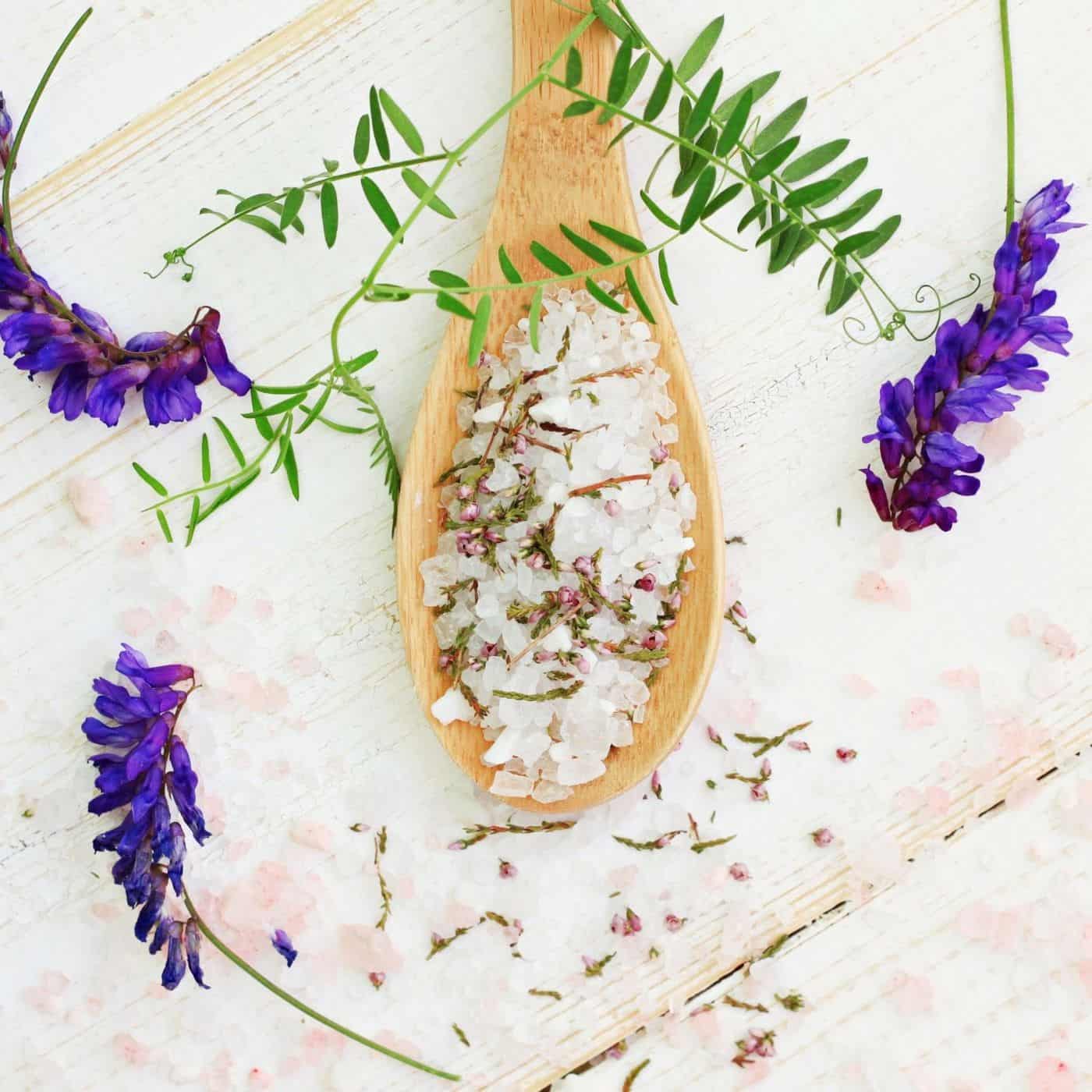
Why is Epsom salt used for plants?
Epsom salt IS used effectively for plants in certain targeted situations. Specifically, a form of magnesium sulfate is used to counteract soil magnesium deficiency in intensively managed industrial crops. Responsible use of Epsom salt in agriculture involves proving that the soil is indeed deficient in magnesium and also that the risk involved with the application is acceptable.
“The science behind the use of Epsom salts is only applicable to intensive crop production in situations where magnesium is known to be deficient in the soil or in the plants. It is irresponsible to advise gardeners and other plant enthusiasts to apply Epsom salts, or any chemical, without regard to soil conditions, plant needs, and environmental health.”
Epsom Salts: Miracle, Myth, or Marketing, by Dr. Linda Chalker Scott, University of Washington
Epsom salts should only be used for plants if a laboratory soil analysis shows a soil magnesium deficiency and a risk analysis deems the application worthwhile. Soil tests for commercial agriculture include specific application instructions for slow-release horticultural magnesium which are custom-prescribed to the plot of land. Industrial agriculture companies also may have their own staff of horticulturalists to examine soil test results and give recommendations.
“A form of Epsom salts is used as a supplement in commercial agriculture where magnesium is deficient. While magnesium deficiency is an occasional problem for tomatoes in intensive agriculture situations, it would be highly unusual for a casual gardener to have this very specific type of deficiency. Why supply extra magnesium if it is not needed, especially if one runs the risk of creating other issues in the process?”
Article – Epsom Salts are Not Recommended: Unnecessary, Potentially Damaging, University of Saskatchewan
As discussed above, Epsom salt is one way to provide a source of magnesium to nutrient-hungry crops growing in magnesium-deficient agricultural soils. That does not, however, make it okay to go out and sprinkle crystals from your bathroom all over your yard.
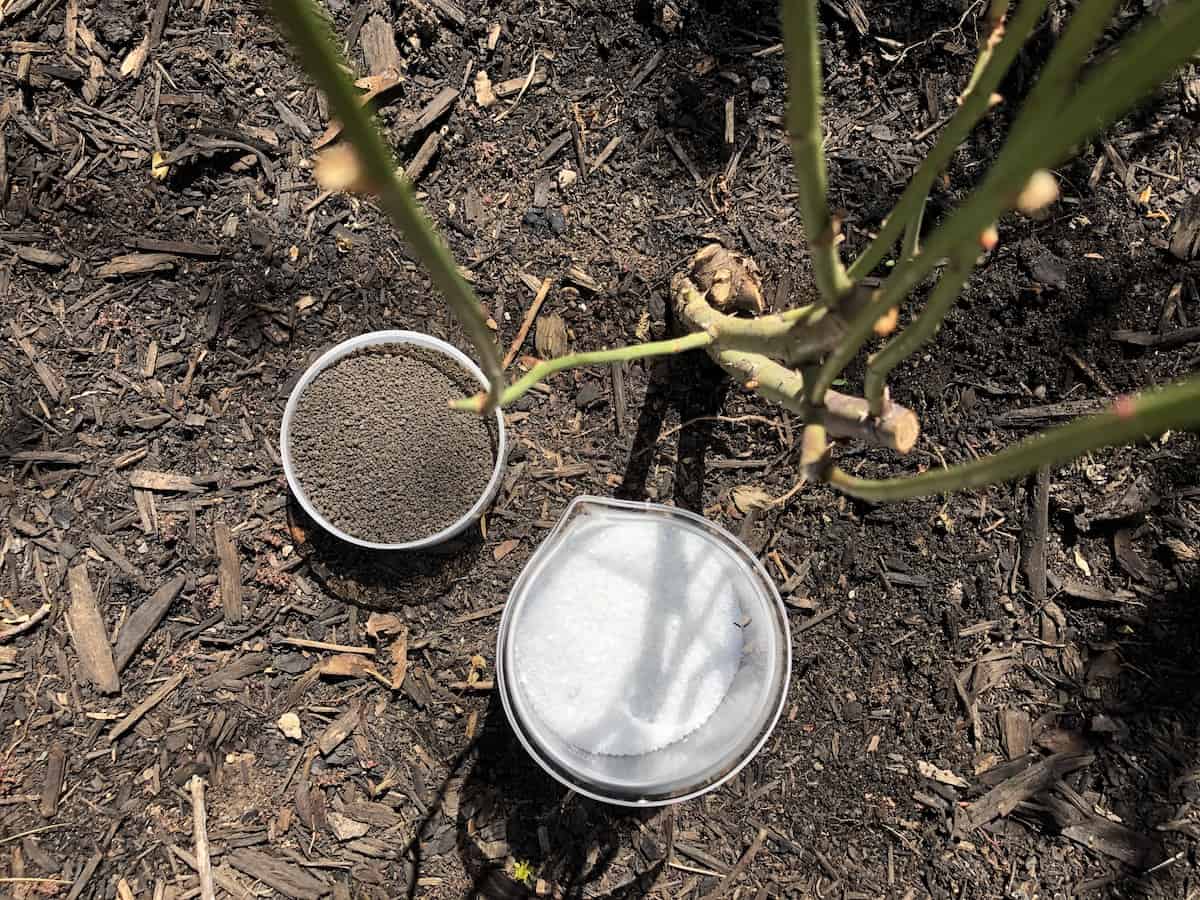
Organic Epsom salt for plants
Is Epsom salt safe for organic gardening? While the crystals beside your bathtub are probably not certified as safe for use in organic growing, there are specialized products that are indeed safe for organic use on plants. An example of an industrial Epsom salt product is Magriculture, by Giles.
Magriculture plant fertilizer is an organic Epsom salt product that is OMRI-Listed for use in organic agriculture – with the restriction that it can only be used if a soil magnesium deficiency has been documented by testing (see OMRI certificate). This agricultural Epsom salt is guaranteed to contain a minimum of 9.8% magnesium (all of which is water soluble). It also contains a guaranteed minimum of 12.9% sulfur (source: Giles). This stuff is for the pros.
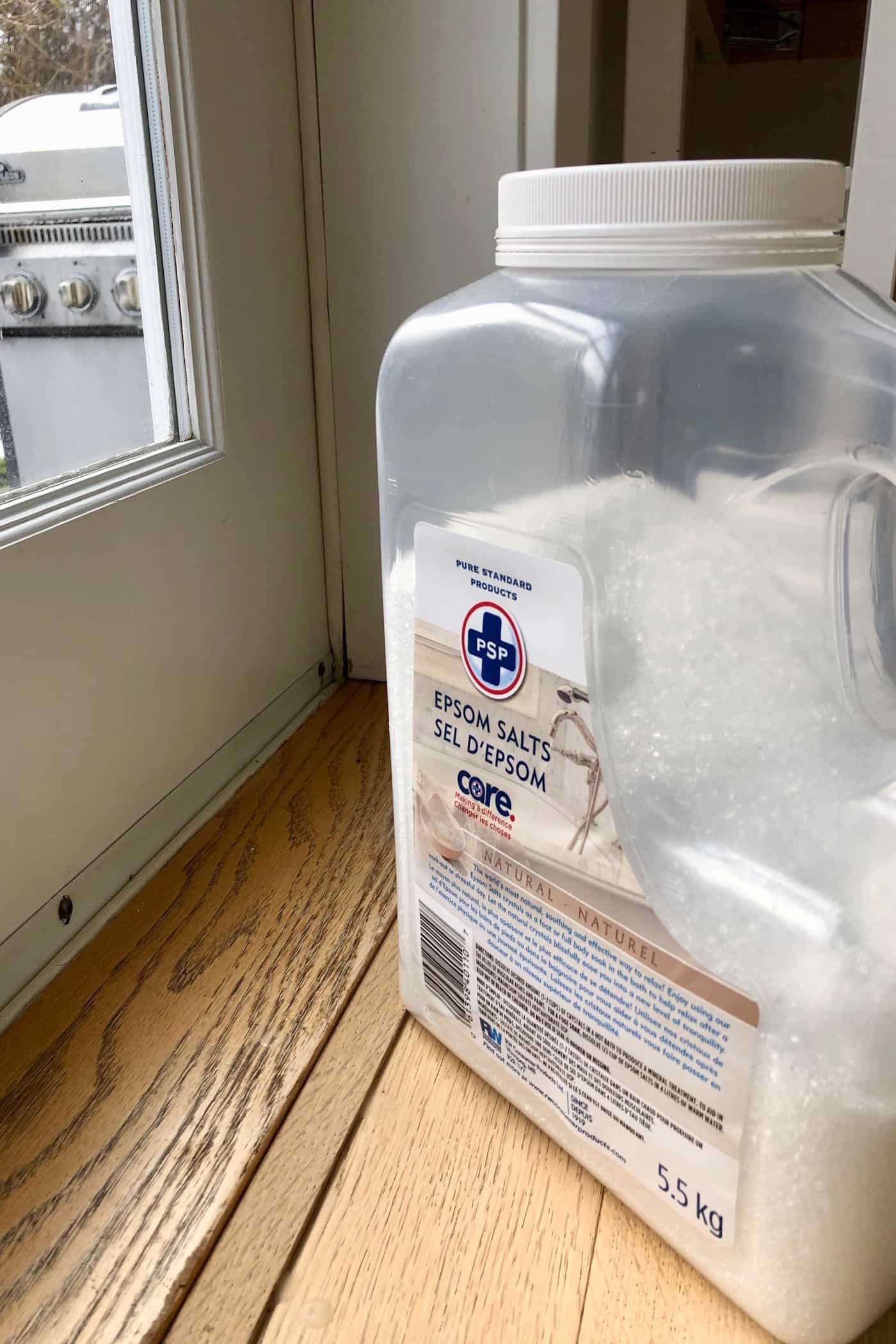
Folk benefits of Epsom salt in the garden
So we have seen that Epsom salt CAN be beneficial to some specific plant crops in very specific industrial conditions. This is related solely to high-production soil that is deficient in magnesium. But are there other benefits beyond soil magnesium deficiency? Pinterest certainly indicates that there must be!
“Epsom salt – actually magnesium sulfate – helps seeds germinate, makes plants grow bushier, produces more flowers, increases chlorophyll production and deters pests, such as slugs and voles. It also provides vital nutrients to supplement your regular fertilizer”
Six Ways to Use Epsom Salt in the Garden, The Epsom Salt Council
The quote above is from The Epsom Salt Council, and it sums up many gardeners’ perspectives on the usefulness of magnesium sulfate in the garden. There are likely countless more perceived benefits of Epsom salt in the garden circulating around out there.
Beyond adding magnesium to the soil, none of these advertised benefits are substantiated by scientific research. The article “Miracle, Myth, or Marketing: Epsom Salts,” by Dr. Linda Chalker Scott (Washington State University) is particularly insightful on why each of these perceived benefits are mythical. Trust me, it’s a worthwhile read!
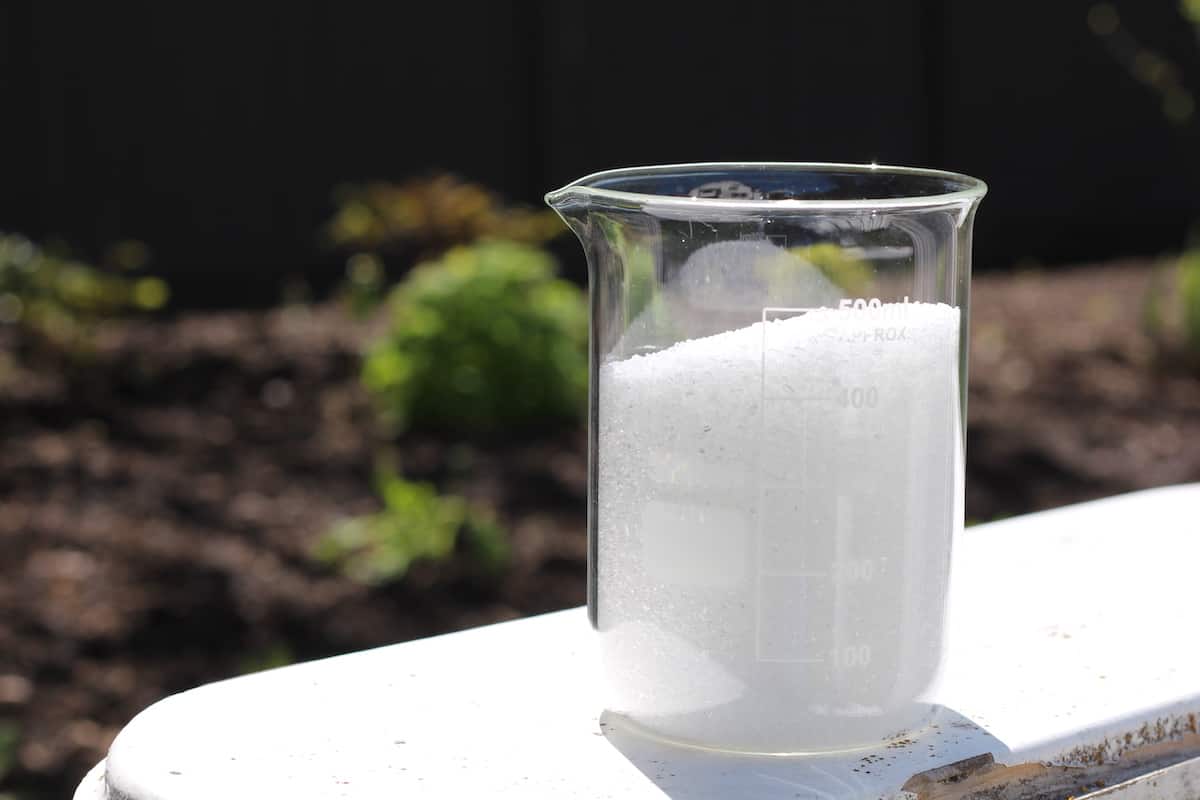
If you still reeeeaaallly want to use Epsom salt in your garden, I suggest referring to the article “Fertilize with Epsom Salt” on Garden.org. Written by horticulturalists Charlie Nardozzi, this article describes how home gardeners could use Epsom salts, particularly as a foliar spray. But as the article states, “Before you try Epsom salts, test the soil to determine its magnesium content.” Use the kind of soil test that gets sent off to a laboratory (not the at-home kind).
Further Reading: How to Test Garden Soil
The myth is that Epsom salts, or magnesium sulfate, is a safe and natural home remedy you can use to increase plant growth. You can find information from all kinds of sources that swear by using Epsom salts for great roses, to get their turf greener, and to control pests, but there is no science behind any of this. The only time that it does any good to add Epsom salts is if you have a magnesium deficiency, and a soil test will tell you if you have one.
Gardening Course: The Science of Gardening, from The Great Courses, by Dr. Linda Chalker-Scott
Any fertilizer should only be added to the garden if it is in fact required and the risk of applying it is acceptable. When considering risk, remember that the ratio of magnesium to calcium is very important for nutrient uptake in plants. This includes plants in your yard and plants in the wider ecosystem. Healthy soil generally has 10x more calcium than magnesium. The actions of humans can upset the natural balance of the soil ecosystem. It’s true that plants need magnesium, but there really can be too much of a good thing.
Also, know that the Epsom salt you buy in a big jug at the pharmacy is not necessarily a “natural” product. Epsom salts that you buy in a big jug probably came out of a chemical plant in Illinois rather than from some kind of artisanal local rock quarry. But we’ll get into that later on!
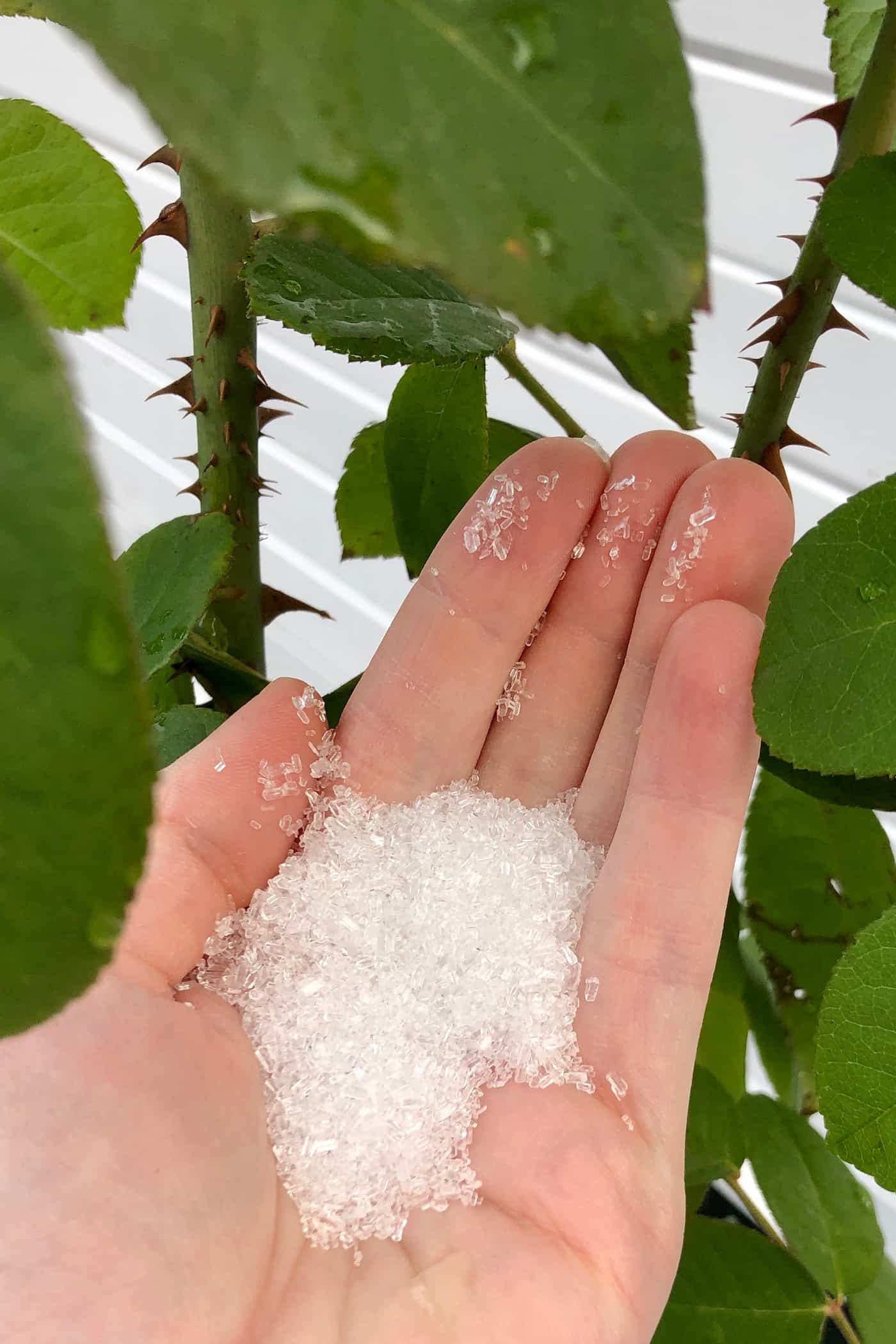
Using Epsom salt in the garden
Wouldn’t it be great if cheap stuff we already had around the house could be repurposed into magic tomato fertilizer? I still have some Epsom salts from Costco that my midwife recommended. I’ll be dreaming of a future with relaxing baths instead of using it on my new roses :)
Risks of using Epsom salt in the garden
If you’ve taken a bath in Epsom salt, you’ll know that Epsom salt is highly soluble. Soluble chemicals are easily transported in solution with groundwater. You can therefore be pretty confident that much of the Epsom salt you place on your soil will wash into local groundwater. It’s not just going to disappear down into the earth, never to be seen again. It’ll be in the soil, disrupting that important calcium-to-magnesium ratio that plants depend on.
So, save the Epsom salt for the bath. Choose a proper organic fertilizer for your plants, such as:
- Azomite (balanced mineral fertilizer mined in Utah)
- Espoma Plant-Tone (mixture of mined minerals, alfalfa meal, poultry manure, and feather/bone meal, from New Jersey)
- Worm Castings Organic Plant Food (worm manure)
If you do have a legit laboratory soil test indicating a magnesium deficiency, the laboratory can (and generally will) provide site-specific fertilizer instructions. Your local Master Gardeners or State Extension Office may also be helpful in interpreting the soil analysis with you as they’ll be familiar with local soils. Use the data to get your soil in the balance!
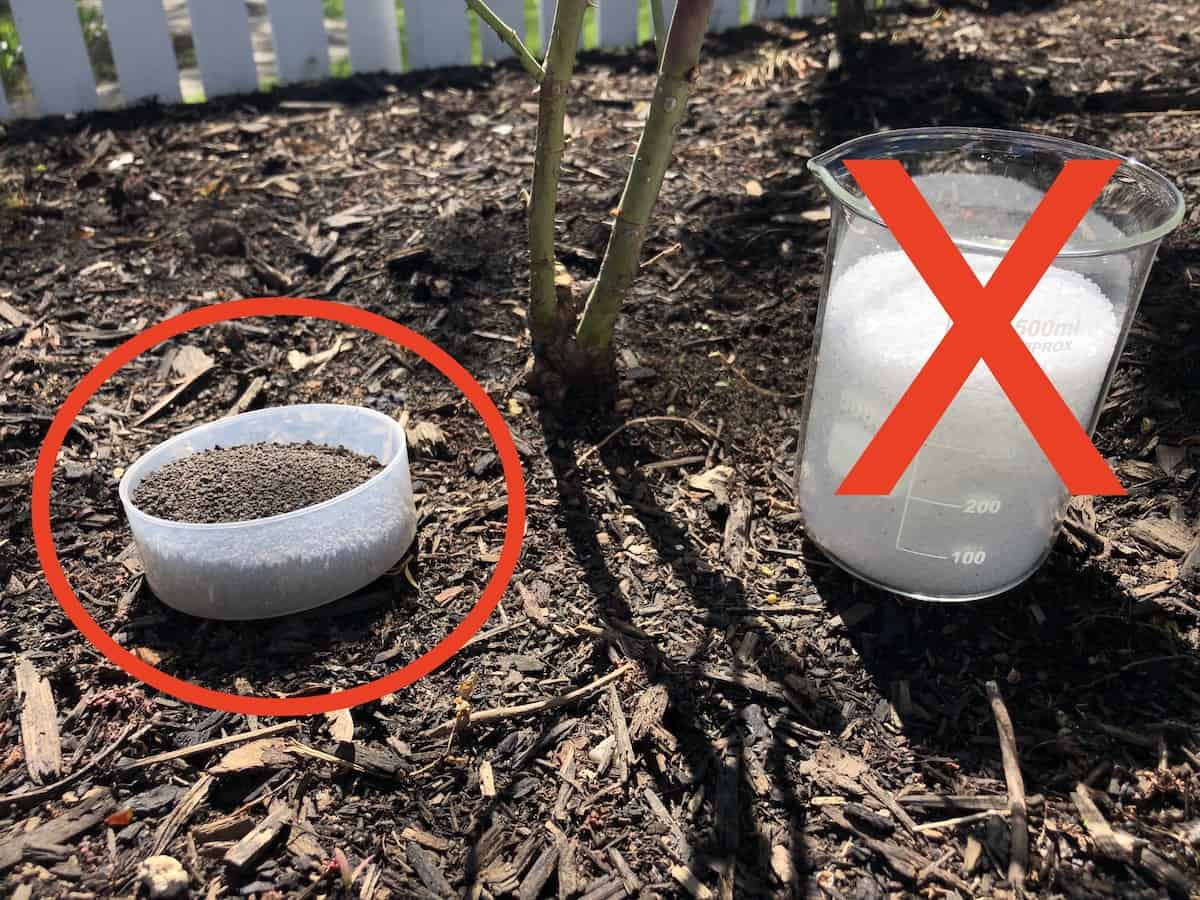
Epsom salt for roses
Roses are no exception. Do not use Epsom salt to fertilize roses in your garden. I feed my roses with a nice top-dressing of homemade compost! They get a nice new layer of compost on the soil as mulch each spring and fall.
I do also feed my roses with a packaged organic rose fertilizer in the spring as they come out of dormancy. I’m in Canada, and I use PRO-MIX Flower Boost on my rose plants. If I were in the States, the rose food from Espoma is certainly worth considering. The magnesium in that rose food is derived from Sulfate of Potash Magnesia (rather than Epsom salts), and more than half of the magnesium isn’t water-soluble… And it’s not sold next to the band-aids…so that’s a good sign.
Because I Care: I tweeted Espoma to ask if they use Epsom salt in their products – they confirmed a solid NO on that one:
Here is a good little tip for feeding roses from David Austin Roses:
Do not be tempted to over-feed – this will, in fact, do more harm than good.
How to Feed a Rose, David Austin Roses
Epsom salt for tomatoes
Even heavy-feeding plants like tomatoes and peppers only need a tiny bit of magnesium. As was noted in a previous quote, it is also extremely unlikely that your garden soil is deficient in magnesium. It is, however, completely plausible that a percentage of the Epsom salt you put in your garden will wash away into the groundwater and pollute the local ecosystem. Not good!
Epsom salts are also not a fix for blossom end rot on tomato plants. Tomato blossom-end rot is caused by a calcium deficiency. Epsom salt does not contain calcium (source: North Dakota State University).
Fertilizing with magnesium salt can actually increase the chances of blossom end rot. Clemson University provides this excellent explanation for this phenomenon:
Avoid excessive potassium or magnesium fertilization as these nutrients will compete with calcium for uptake by the plants. Epsom salts is an example of a magnesium source, so do not apply to garden soil unless a recent soil report indicates a magnesium deficiency.”
Tomato Diseases & Disorders, Clemson University
Adding Epsom salts without adding calcium upsets the natural mineral balance of the soil. This can create “magnesium toxicity” in the soil. Epsom salts do not prevent tomato blossom-end rot… it can actually cause it.
Epsom Salt For Houseplants
Epsom salt poses a risk to houseplants. Houseplants in containers are susceptible to magnesium toxicity as the mineral is not able to wash out into the surrounding soil. While the magnesium may wash to the bottom, it can still be trapped in the container. This can make it difficult for the houseplant to absorb calcium.
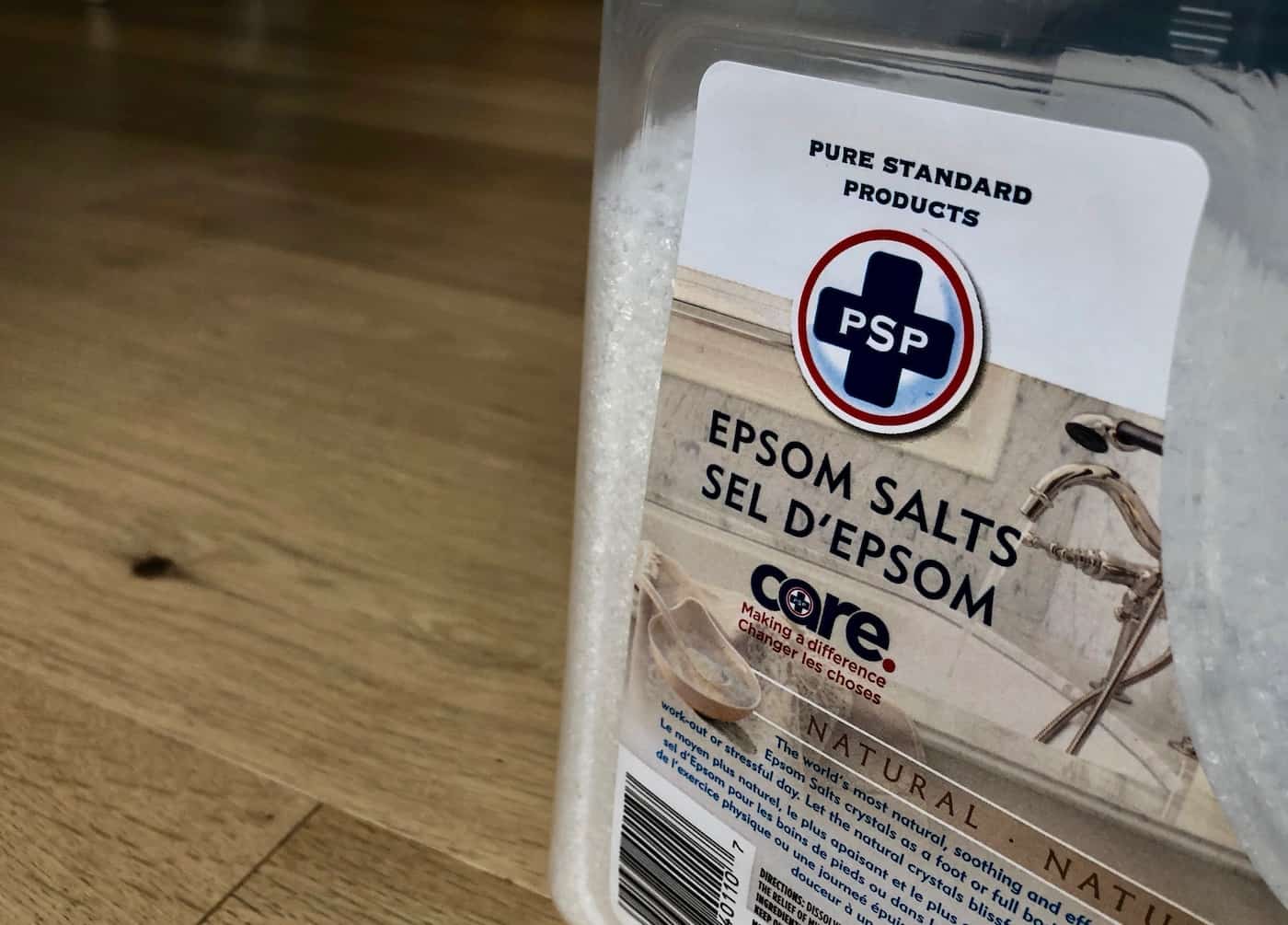
So, Epsom salt is not some “miracle cure” for your garden. It’s not even something you should be sprinkling around your plants for “a little extra luck”. Step away from the Epsom salts. Here is a nice podcast from the Joe Gardener Show to listen to while you enjoy your Epsom salts in the bath instead of the garden:
Joe Gardener Show – Episode 034 – Gardening Myths BUSTED, Pt. 1 with Linda Chalker-Scott


